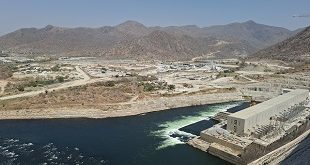
Mining multinational Glencore’s leadership must be held accountable for company’s corrupt behavior
COMMENT | NJ AYUK | When U.S. energy company Enron made global headlines in the early 2000s for accounting and corporate fraud, attention was on the decision-makers behind the company’s actions. Ultimately, Enron executives Kenneth Lay, Jeffrey Skilling, and Andrew Fastow were convicted on federal felony charges.
That was the appropriate response. When corporations engage in illegal behavior, the people responsible should face repercussions — and they often do.
Why, then, have the executives at Switzerland-headquartered commodities and mining multinational Glencore Plc been spared the consequences of their responsibility for years-long corrupt behavior?
In May, two of the company’s subsidiaries pleaded guilty to charges of market manipulation and bribery in multiple countries after extensive investigations by Brazil, the United Kingdom, and the United States. One month later, a Glencore subsidiary pleaded guilty to seven counts of bribery related to its oil operations in Cameroon, Congo, Equatorial Guinea, Ivory Coast, Nigeria, and South Sudan.
I realise that more than USD 1.5 billion in penalties have been imposed on Glencore by the U.S., the United Kingdom, and Brazil — and more could follow after Swiss and Dutch investigations are completed. But the repercussions shouldn’t be limited to fines. No company has ever pleaded guilty to this much corruption. We find it extremely troubling that the executives who approved and benefited from the corruption have, as of yet, gone unscathed.
The African Energy Chamber strongly believes that Glencore’s leaders must be held accountable for their actions. Anything less sends the message that “bribery is a necessary evil” in regions of the world like Africa. That is not true. Now is the time to make that reality abundantly clear to corporate leaders who do business here.
It’s important to note that Glencore’s actions were more than a one-time event. Glencore International A.G. and its subsidiaries bribed officials in seven countries for more than a decade. Indeed, corrupt behavior was well-ingrained into the company culture. Bribery was simply one of its operating expenses.
It’s also galling to see how Glencore behaved in African countries. In 2015, for example, when Glencore wanted to buy cargoes of oil from Nigeria, it submitted $50,000 per cargo for what it described as “advance payment.”
The result for Glencore: USD124 million in illicit profits. The results for Nigeria’s government, businesses, and communities: lost opportunities to engage in productive partnerships with companies interested in creating jobs, supporting local businesses, sharing knowledge and fostering economic growth.
Glencore also managed to avoid consequences for unethical business dealings in Africa. In one instance, after the company was sued for breach of contract in the Democratic Republic of Congo and fined USD16 million in damages, Glencore paid the judge $500,000, and the lawsuit “disappeared.” Glencore has admitted to paying USD27.5 million in bribes in DRC alone.
Adding insult to injury in the Glencore scandal are the obvious double standards we’ve been observing. Consider IOCs’ know-your-client (KYC) and due-diligence policies for doing business in Africa. Local company representatives who dare to bribe or tip a police officer who harasses them on the streets are told by IOCs that they do not pass due diligence. They will never be contracted to provide goods or services.
I want to be clear: I respect companies that demonstrate high standards for ethical behavior. The problem comes when those standards are not applied evenly.
At the same time as African companies are being scrutinised for the slightest hint of corrupt behavior, Glencore continues to do business with oil, gas, and mining companies that claim to be champions of transparency. Banks are still working with Glencore as well. Aside from some negative attention and financial repercussions, Glencore seems to be avoiding serious consequences for its actions.
Last spring, I called for the Oslo-based Extractive Industries Transparency Initiative (EITI) to rescind Glencore’s membership, noting that the company’s involvement with EITI began while Glencore was engaging in the exact type of behavior that the initiative strives to eradicate. That hasn’t happened. EITI expressed concern about Glencore’s behavior in a statement by its board chair, Rt Hon Helen Clark, but nothing more has come of it. Their silence is betrayal to the very principles that they cherish.
Let’s look at the penalties imposed on Glencore. They’re large, but when you consider Glencore’s size and resources, it is difficult to imagine they’ll have a significant impact. On the contrary: Glencore appears to be thriving. In a recent article, United Kingdom-based Proactive Investors Limited noted that Glencore shares have increased in value by more than 50% during the last year.
“One reason why is that all the ESG (environmental, social and corporate governance) bluster about ending coal use is now being thrown out of the window by one European country after another, and Glencore produces a lot of coal,” Proactive writes.
And that’s only part of the picture for Glencore. As Christopher Helman wrote for Forbes, “Glencore is in the enviable position of being among the world’s biggest energy traders at a time of surging prices and shortages, as well as one of the biggest miners of metals like copper, aluminum and cobalt — all vital in making batteries for electric vehicles and other alternative energy sources.” Which means, while billions of dollars of fines may sting a bit, Glencore isn’t likely to feel it in the long term.
Glencore’s African victims aren’t quite so bullet-proof, but we have yet to hear talk about compensating them for the corruption and injustices that have taken place in their countries.
Africans, then and now, need good governance to meet their needs, grow the economy, address energy poverty, create job and business opportunities, and foster stability. Bribery undermines all of that. Currently, African oil- and gas-producing countries are fighting to sustain their energy industries — which are capable of supporting the goals listed above — against tremendous pressure from environmentalists and Western countries that want to see an immediate transition to green energy in our continent. Yes, Europe has eased up somewhat as it looks to Africa to help it lessen its reliance on Russian petroleum, but that won’t last forever.
Glencore’s corrupt acts and manipulation have robbed African countries of some of the precious time they need to fully capitalise on their oil and gas resources.
And the damage doesn’t stop there. Corruption robs people of justice. Instead of empowering people to better their lives, it entrenches poverty in communities. It’s an ingredient for dissatisfaction, lack of trust in government leaders, instability, and even violence. Yes, every corrupt act that Glencore engaged in involved another party — an outreached hand to accept their bribes. But the company’s “all-in” embrace of bribery, with grotesquely large payments, helped corruption gain a firmer foothold in Africa.
Again, Glencore’s corruption is about more than a company: It all goes back to the people calling the shots. Glencore should face the same kinds of repercussions African companies would for blatant, ongoing corruption. It should not be doing business as usual. And neither should the executives behind Glencore’s actions.
****
Nj Ayuk is a Cameroonian attorney, entrepreneur and founder and chief executive officer (CEO) of the Centurion Law Group
 The Independent Uganda: You get the Truth we Pay the Price
The Independent Uganda: You get the Truth we Pay the Price


